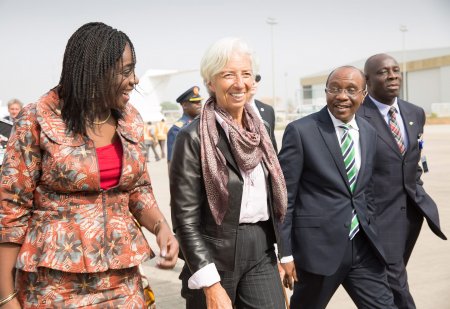P
ProfRem
Guest
Oluseun Onigbinde, lead partner at BudgIT, a civic organisation that works to engage citizens on how public budgets work has pened down his opinion about the visitation of IMF's Boss, Christine Lagarde and the overview aspect of the Nigeria's currency vis-a-vis the economy.
READ:
When Christine Lagarde, the managing director of the International Monetary Fund, visited Nigeria this week, she called for more flexibility on the exchange rate, encouraging those who believe the naira could be devalued again very soon.
Her visit placed an uncomfortable spotlight on the fiscal woes of Africa’s biggest oil producer. Many Nigerians feel we are in a tough corner, and concern is growing over what President Muhammadu Buhari will do to plug the foreign exchange gap, boost revenues and diversify an economy that Lagarde said is too reliant on oil.
Before Lagarde touched down in Abuja, Nigeria’s central bank had been struggling to meet demand for forex while maintaining adequate reserves. The country’s external reserves dipped from $43.5bn (£30bn) in January 2014 to $29.4bn at the end of 2015.
About 90% of Nigeria’s foreign exchange income is tied to oil revenues, and the drop in prices to below $35 a barrel has resulted in forex earnings from this commodity tumbling from $20bn in the third quarter of 2014 to $11.6bn in the third quarter last year (pdf).

The central bank governor, Godwin Emefiele, has so far imposed controls, drawing up a list of items that cannot be imported with officially sourced foreign currency. Banks are no longer taking forex at the counter, and Nigerians are allowed to withdraw no more than $300 a day at channels located abroad with their naira-denominated cards. There are also limits on how much foreign currency they can spend online.
These measures have enraged Nigerians, with some finding themselves stranded on holiday or in cyberspace, unable to pay for hotels or shopping. Businesses have to wait weeks to liquidate foreign exchange orders, hurting capital mobility.
And still the demand outstrips supply. The central bank was able to meet only a 10th of orders for foreign exchange in the third quarter (pdf), with demand rising to $61bn, while supply to banks and other licensed operators stood at $6bn, ultimately fuelling the parallel “black” market.
The disparity between the official exchange rate and black market rates has risen to more than 35%, but the central bank is still insisting it will not officially devalue the currency. Its determination to maintain this tough grip on the exchange rate is already affecting gross domestic product, with growth down to 2.84% in the third quarter of last year compared with 6.23% a year earlier.
The wider picture is that investor appetite remains weak compared with levels seen before Buhari’s election in March. Foreign investors are worried about the risk of devaluation but also affected by the wider withdrawal of funds from emerging markets because of the US Federal Reserve’s decision to raise interest rates last month.
Read on Guardian UK
READ:
When Christine Lagarde, the managing director of the International Monetary Fund, visited Nigeria this week, she called for more flexibility on the exchange rate, encouraging those who believe the naira could be devalued again very soon.
Her visit placed an uncomfortable spotlight on the fiscal woes of Africa’s biggest oil producer. Many Nigerians feel we are in a tough corner, and concern is growing over what President Muhammadu Buhari will do to plug the foreign exchange gap, boost revenues and diversify an economy that Lagarde said is too reliant on oil.
Before Lagarde touched down in Abuja, Nigeria’s central bank had been struggling to meet demand for forex while maintaining adequate reserves. The country’s external reserves dipped from $43.5bn (£30bn) in January 2014 to $29.4bn at the end of 2015.
About 90% of Nigeria’s foreign exchange income is tied to oil revenues, and the drop in prices to below $35 a barrel has resulted in forex earnings from this commodity tumbling from $20bn in the third quarter of 2014 to $11.6bn in the third quarter last year (pdf).

The central bank governor, Godwin Emefiele, has so far imposed controls, drawing up a list of items that cannot be imported with officially sourced foreign currency. Banks are no longer taking forex at the counter, and Nigerians are allowed to withdraw no more than $300 a day at channels located abroad with their naira-denominated cards. There are also limits on how much foreign currency they can spend online.
These measures have enraged Nigerians, with some finding themselves stranded on holiday or in cyberspace, unable to pay for hotels or shopping. Businesses have to wait weeks to liquidate foreign exchange orders, hurting capital mobility.
And still the demand outstrips supply. The central bank was able to meet only a 10th of orders for foreign exchange in the third quarter (pdf), with demand rising to $61bn, while supply to banks and other licensed operators stood at $6bn, ultimately fuelling the parallel “black” market.
The disparity between the official exchange rate and black market rates has risen to more than 35%, but the central bank is still insisting it will not officially devalue the currency. Its determination to maintain this tough grip on the exchange rate is already affecting gross domestic product, with growth down to 2.84% in the third quarter of last year compared with 6.23% a year earlier.
The wider picture is that investor appetite remains weak compared with levels seen before Buhari’s election in March. Foreign investors are worried about the risk of devaluation but also affected by the wider withdrawal of funds from emerging markets because of the US Federal Reserve’s decision to raise interest rates last month.
Read on Guardian UK

